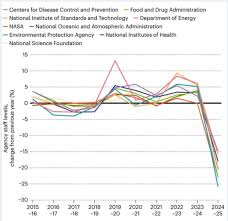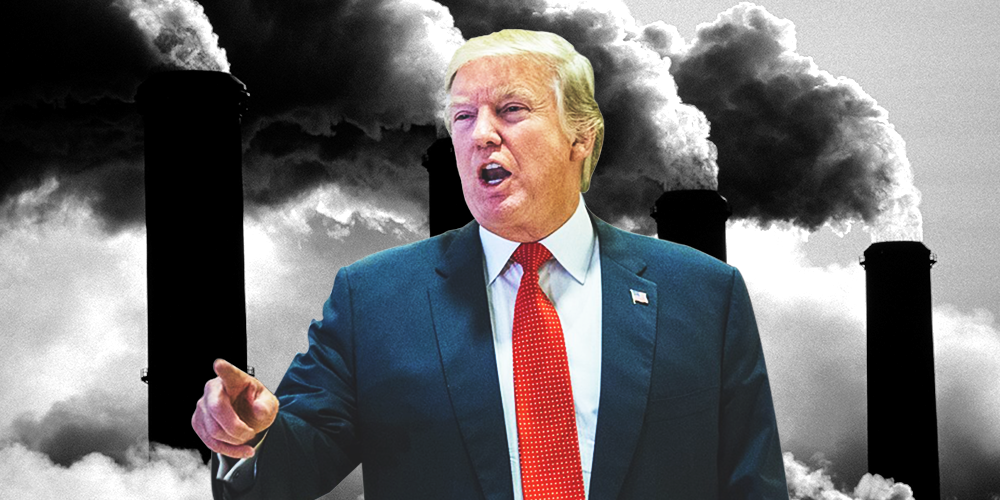Want to Fight for Science? Look to South Dakota. No, Really.
We need a permanent grassroots strategy for science before we are buried in Idiocracy.
Nature this week offers a series of terrifying, interactive graphs detailing the Trump Administration’s Idiocratic War on Science. Not only has it butchered federal scientific research grants, but as you can see in this graphic, it has hollowed out the federal scientific workforce – the dedicated professionals who develop data to allow for science-informed policy in the first place, and monitor and audit the grants to make sure that they do what they are supposed to....
CONTINUE READINGOne Year of Energy Emergencies
The Drain is a weekly roundup of environmental and climate news from Legal Planet.
This past Tuesday — on the one-year anniversary of Donald Trump taking office and immediately declaring a national energy emergency — the new governor of New Jersey took office and immediately declared a state energy emergency. But these two approaches to executive action on energy couldn’t be more different and the results will help define the affordability debate in 2026. During her inaugural speech, New Jersey Governor Mikie Sherrill signed two executive ...
CONTINUE READINGWhat Critics of the Unitary Executive Missed
This conservative theory has damaged democracy in unexpected ways.
At its core, the unitary executive theory (UET) says that the President can fire anyone in the executive branch for any reason or no reason. Although the UET purports to be based on originalism, it has become clear that the Court has no interest at all in examining the history. Supreme Court conservatives think complete presidential control is simply the ideal way to run the government. The deep flaws in that theory are now becoming apparent. Critics of the unitary e...
CONTINUE READINGAlejandro Camacho Joins UCLA Law Faculty
Camacho will be a core faculty member of the UCLA Emmett Institute and a contributor to Legal Planet.
At this critical moment in environmental law, the Emmett Institute at UCLA School of Law keeps growing stronger. We are pleased to welcome Alejandro Camacho, a renowned regulatory scholar, as a professor of law. Camacho will be a core faculty member of the Emmett Institute on Climate Change and the Environment and a faculty associate of UCLA’s Chicano Studies Research Center. More importantly for you, dear reader, he’ll be a regular contributor to Legal Pla...
CONTINUE READINGUCLA Report Offers Framework for Resolving Coastal Conflicts
Guest contributors Maeve Anderson and Mackay Peltzer write that regulatory updates are needed to ensure California’s coastal planning remains consistent with the intent of the Coastal Act.
California’s iconic coastline is simultaneously a source of pride and tension for the state. As increasingly severe storms, intensified by climate change, accelerate the erosion of beaches and bluffs, the conflict around land use at the coast has also intensified. Nowhere exemplifies this reality better than the City of Pacifica, a popular surfing destination located between San Francisco and Half Moon Bay, where battles over land use planning in the wake of sea ...
CONTINUE READINGAnother White House Power Grab: PJM
Why emergency power auctions for the AI overlords will do little to reduce electricity prices.
Fresh on the heels of the White House takeover of Venezuela and its “uninvestable” oil sector, President Trump, Energy Secretary Chris Wright, and the rest of the National Energy Dominance Council have turned their sights on the largest wholesale electricity market in the United States – PJM. Their concern is high prices, which continue to rise in significant part because of all the data center demand in the region and the deeply problematic structure of the ...
CONTINUE READING“Smog and Sunshine” Has a Release Date
And this "Surprising Story of How Los Angeles Cleaned Up Its Air" is now available for preorder.
My book, "Smog and Sunshine: the Surprising Story of How Los Angeles Cleaned Up Its Air," will be released on April 7! It's been a long time coming. My author page is here And you can find links to preorder my book by clicking here or here Here's how UC Press describes the book: Los Angeles and smog have been synonymous for decades. From the 1940s through the 1980s, children breathed air so heavy with lead that their blood was poisoned with it. In 1970 offici...
CONTINUE READINGNightmare on Penn Ave (Part 2)
After a year of Trump 2.0, here’s how things stand.
Almost eight years ago to the day, I wrote a post titled “One Year and Counting.” I was writing at the end of Trump’s first year in office. And here we are again, one year into a second Trump Administration. Trump’s basic hatred of environmental protection is unchanged. But this time he has adopted a more radical approach. Below, I'll explain the similarities and differences between the headstrong anti-environmentalism of the first term and the harder-edg...
CONTINUE READINGSEQRA Reform
No, not CEQA, SEQRA. New York appears to be following California’s lead in overhauling state-level environmental review.
New York Governor Hochul this week proposed amendments to New York’s State Environmental Quality Review Act (SEQRA). The press release has a breathless title: “Let Them Build.” But the proposal itself appears to be very similar to what California just enacted. Housing projects in already developed areas, along with some other similar projects, such as parks, trails, child care centers, and some water infrastructure, will be exempted from review under SEQRA. ...
CONTINUE READINGCreating Lease Certainty
There are some steps Congress could take to increase certainty for energy leases on federal lands, but there will be tradeoffs.
As my prior two posts noted, there are substantial legal authorities that allow an executive to suspend or cancel leases for energy development. In the case of on-shore leases, that power might be extremely broad. And with an Administration that appears to use its powers to pursue political grudges and to push the envelope on what is legally permissible, whatever the cost to the long-term interests of the country, that kind of broad power might be a problem. But a...
CONTINUE READING











